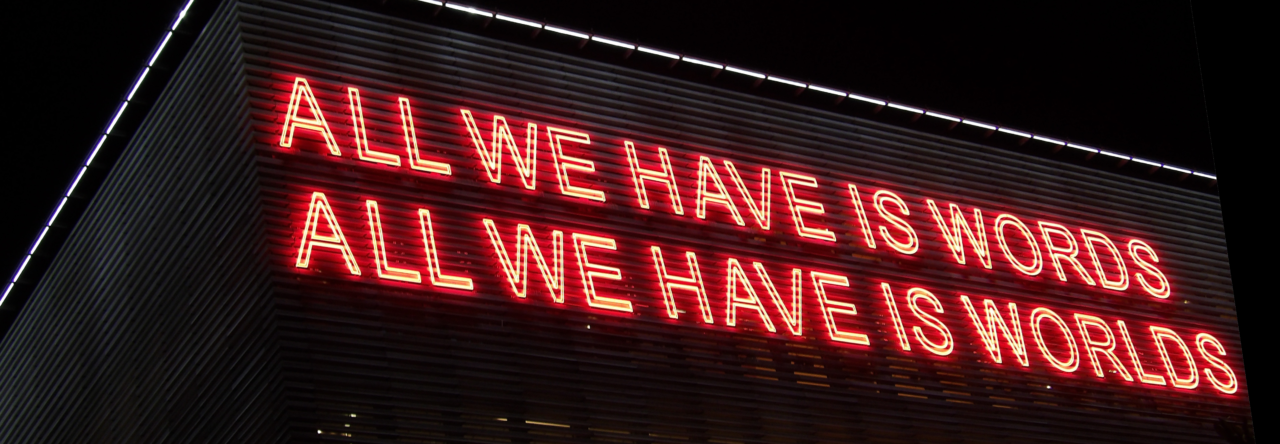On November 17, I attended a conference in Dundee entitled Abundant Word: Writing & Gesture in Interactive Media. All of the speakers offered inspiring ideas, but I was particularly struck by Broderick Chow’s talk, “British Lads, Hard Lads: Violence, Care and Speculative ‘Writing.’” He put forth a fascinating argument that speculative writing is a deeply risky and precarious endeavor, because it transforms the ways we are invested in writing or, indeed, in reality: It asks creators to invest themselves deeply in a version of a text or of a world that they want and need, even despite the knowledge that it could be overturned at any moment (e.g., when canon contradicts fanfic). By putting so much time and emotional investment into speculative work, creators open themselves to the risk of devastation by the forces of canon or of reality beyond their control.
I struggled at first with this concept because — while I understood it intellectually — I found that it contradicted my own experience with speculative writing. Generally, I find writing speculative fiction to be joyful and even liberating, as I use it to imagine worlds where the tough problems that we face are in fact solvable — or, if I need an escape, worlds where some of the prejudices and constraints of real life don’t exist. To couch speculative modes in terms of risk seemed to me to imply fear, which is the precise opposite of how I approach my practice. However, a discussion with my classmates and fellow attendees helped me to realize that, perhaps, I am able to ignore some of the risks of speculative work because I occupy a relatively privileged position where the destruction or undermining of a speculative concept will not harm me beyond the level of emotional distress.
Reflecting on this idea made me wonder about what the creative piece of my Futures Project would be risking in its speculation, and who that risk might impact. Is there a way that I can put myself as the author into the position of risk, in order to enable my audience to partake of the joyful aspects of speculative work? Or is risk unavoidable for anyone who engages with this kind of work? Could my piece be an invitation to readers to engage in speculative imagination, imagining a new world where the hegemonic paradigms of technological advancement and control are not necessarily the inevitable path into the future? This relates to my reflections in Week 6 about risk-taking in games and interactive experiences, and reinforces my sense that I don’t want to put readers/audiences in the position of feeling like they’ve “done it wrong.”
In his talk, Chow also addressed two other concepts that feel pertinent here. First, he explained how desire is a form of interactivity, in that it sparks readers’ engagement when they encounter a work and think, “I want that world.” Writers are often advised to write the book that they have needed/wanted to read — to create the world that they need/want — but this idea of interactive desire, coupled with more conventional forms of interactivity, makes me wonder if my piece could encourage readers to take part in that creative process rather than only partaking of its results.
Chow also argued that speculative modes of writing hold open space for uncertainty and “non-confirmation” in relation to their antecedents. Uncertainty feels like a vital concept when considering speculative futures, as it pushes back against the inflexibility bordering on determinism that dominates many current conversations about the “inevitable” future of technology and AI in particular. This makes me consider how uncertainty can be intertwined with the hope and joy that I have experienced when working in speculative spaces. It also connects to the uncertainty that I (and, I think, many others) experience when trying to envision more just and sustainable futures — as well as to the uncertainty or randomness that programmatic/computational methods are uniquely able to offer in a creative practice. I need to do some more thinking about how all of these types of uncertainty can speak to each other in my project.
On a somewhat different note, another takeaway from Abundant Word for me was a concept that Lynda offered in her talk: the idea that a small player choice can create meaning even when all options lead to the same endpoint, because of how that endpoint then reflects back and invites reinterpretation of the choice that led to it. In this context, choices operating on a linguistic level — even ones that don’t change literal events — could be interesting in creating meaning. For example, readers could choose between two metaphors that don’t create a branch in the narrative but just inflect it differently; a series of such choices over the course of the story could ultimately create a very different mood or emotional subtext, even in the context of unchanged major plot points.
Finally, I also wanted to reflect on Christopher Murray’s exploration of “Comics, Gesture and Interactivity” — particularly the contrast that he drew between how video games offer agency (or a sense of agency) at the macro plot level, while comics offer agency at the micro level within each panel, letting readers envision and participate in the creation of the narrative. For my Futures Project, I think I am most interested in the micro forms of agency — but since I’m currently not envisioning an intensive or representational visual element, what could be the equivalent in a predominantly written story? It seems that an important element of the agency afforded by comics is the fact that it is not explicitly offered in the form of a question or branching choice, but rather is prompted by the form itself — a gentler form of agency that does not put the reader on the spot, but rather invites them inside if they choose. I’d like to capture this sort of gentleness in my project.



Leave a Reply